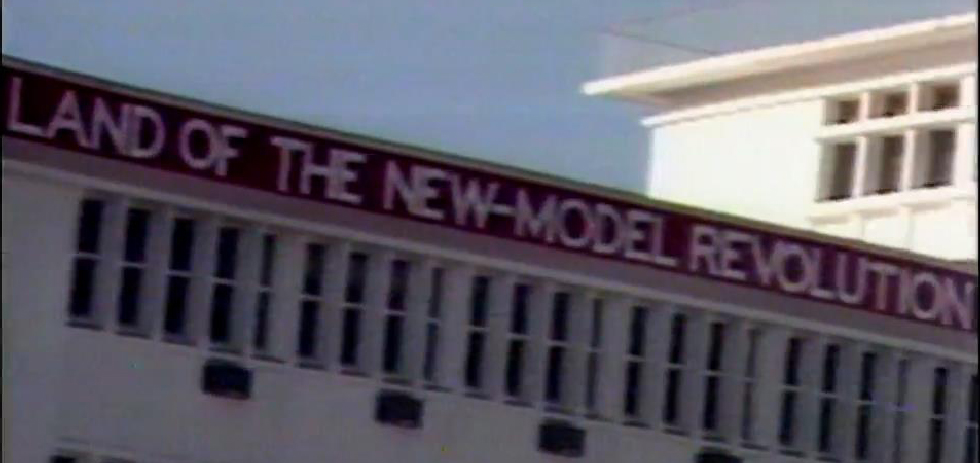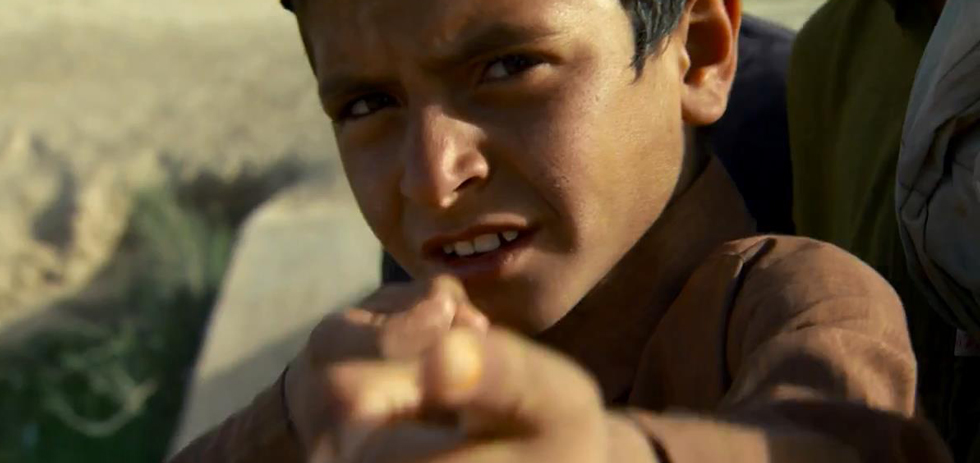
In 1945, Franklin D. Roosevelt met Ibn Saud, King of Saudi Arabia, on a boat on the Bitter Lake, part of the Suez Canal. In this meeting, the two built the foundations of a somewhat fateful arrangement: the exchange of American loyalty for the wellspring of cheap Saudi oil that had recently been unearthed. Bitter Lake, the latest documentary from docu-collagist Adam Curtis, posits this fateful meeting as the nexus of a number of intersecting political narratives on the Middle East – from neoconservative American agitprop to the iconoclasm of Wahhabist Islam.
The historical film occupies a particular place in the grand pantheon of documentary. Its role is to simplify the enormity and complexity of history into clear, digestible narratives. Curtis, occupying the abstract end of the BBC documentary spectrum, has forged a career out of examining narratives and how elites use them to establish consensus. Bitter Lake documents the modern history of Afghanistan as a graveyard for political discourse: where concise slogans and chest-thumping war mantras go to die. You can say that the Soviet Empire died in Afghanistan, and Curtis wants you to think the same thing of the American Empire.
“Increasingly, we live in a world where nothing makes any sense,” Curtis says, in the introductory narration. “Events come and go like waves of a fever, leaving us confused and uncertain. Those in power tell stories to help us make sense of the complexity of reality, but those stories are increasingly unconvincing and hollow.” He argues that in a nation like Afghanistan, which is constituted by a panoply of tribal identities and governments and has resisted the efforts of various colonial administrations to bridge political schisms, easy narratives are too simple to sustain themselves, and inevitably end in collapse.
Afghanistan, for Curtis, represents the supreme object of ideology for a number of conflicting geopolitical players. The Soviets tried to turn it into a model Communist state; the Taliban tried to transform its nominally progressive polity into a premodern vision of fundamentalism Islam; the Americans tried to remodel the shattered nation as the epitome of modern liberal democracy. All failed. Curtis constantly references Tarkovsky’s Solaris, where space travellers to a planet are themselves mentally and spiritually changed by the planet itself. It’s not a perfect metaphor, but it works: Afghanistan, like Solaris, changes interlopers more than they can change it.
Bitter Lake is executed in standard Curtis form. It is a hypnotic mix of archival footage, jarring soundtrack and sparse narration. Some of the footage is extraordinary, and one wonders how the filmmakers were able to get their hands on it. Curtis pivots this visual collage around odd but consistent themes: people dancing, closeups of human eyes, the motion of soldiers on improvised battlefields. Some of the clips – like American educators attempting to explain Duchamp’s “Fountain” to bored Afghani students, or a Russian doctor carefully avoiding incriminating the Soviet regime in an interview – are quite extraordinary.
Curtis directs with the same intensity as a YouTube conspiracy doco producer, and in some senses they are very much aligned. Both weaponise footage – turning in-the-moment footage into aggressive, primitive cinema vérité. However, the rapid-fire editing and progression of his previous ouevre (The Power of Nightmares, The Century of the Self) is missing: this feels much more abstract and languid. Working with a two-and-a-half-hour web film rather than a multipart miniseries, Curtis feels more willing to let certain shots sit for a while. The film lacks the energy or punch of his earlier work as a result.

I have an immediate aversion to documentaries which question the value of simple narratives while also trying to explain truth in the same breath. Curtis has long contended with this problem – The Power of Nightmares suffered from the same difficulties. Curtis believes himself to be a journalist first and foremost, but propensity for nonlinear, patchwork story and angular leaps of logic seem to belie that. Either he isn’t a journalist, or our definition of journalism is woefully inadequate. Either way, the film is epistemologically suspect. Bitter Lake feels hermetically sealed within Curtis’ own mind in a way his others don’t. For example, there is only one (non-archival) interview of note; in it, the interview subject merely agrees with propositions that are being put to him.
Curtis has long used his films to criticise binary systems of morality, and argues that such frameworks are imposed by elites to justify power struggles and ideological conflicts. However, he himself allows his own moral beliefs to infiltrate his exposition even as he approaches something more pragmatic. Adherents of Wahhabist Islam, for example, are always “backwards” and “hateful” and the Saudi elite are the clear villains, always accompanied with dark piano music (the score from John Carpenter’s The Fog, mostly). Whether or not you accept his central moral thesis is largely irrelevant: when the film argues that narratives of good and evil are tools of political elites, Curtis’ own posturing feels hollow.
Bitter Lake is a strong piece of documentary collage. The archival footage is extraordinary, and Curtis himself is deft at manipulating image, movement and sound. As a visual object, the film is strong. As a piece of history, it manages a cohesive narrative on Afghanistan that occasionally lurches into counterhistory. As an epistemological argument, it leaves much to be desired.
Perhaps, as Curtis himself argues, the cratered physical and psychic landscapes of Afghanistan resist all attempts to force narratives upon them – even his own.
Bitter Lake premiered last week at the International Film Festival Rotterdam. It was also made available for streaming on the BBC iPlayer service, where it will still be available for the next month.
Around the Staff
| Conor Bateman |
